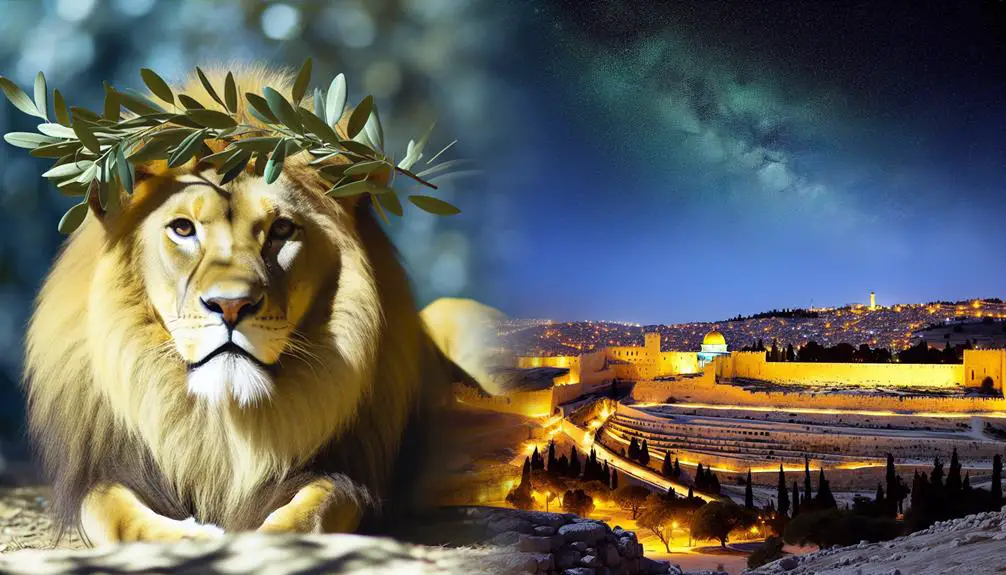Discover the profound legacy of the name Judah in the Bible, a symbol of praise and prophecy shaping ancient and modern narratives.

Meaning of the Name Judah in the Bible
The name Judah might just hold the secrets of the universe within its four letters. When you explore its origins in the Bible, you'll find it weaves a tapestry richer and more intricate than you could imagine.
From its etymological roots, symbolizing 'praise' and 'thanksgiving,' to its bearer's pivotal role in the narratives of Genesis, Judah's significance extends far beyond a mere label. It's a name that carries the weight of prophecy, leadership, and a promise that shaped the course of biblical history.
Let's peel back the layers of this storied name together, and uncover the profound impact it has had on both ancient narratives and modern interpretations.
Key Takeaways
- Judah's name signifies 'praise' and 'thanksgiving,' rooted in Hebrew etymology.
- The name reflects Judah's cultural and spiritual depth within ancient Hebrew narratives.
- Judah's leadership and spiritual legacy are symbolized through its royal lineage and covenantal promises.
- The enduring legacy of Judah influences contemporary culture, religious practices, and geopolitical identities.
The Etymology of Judah

Delving into the etymology of the name Judah reveals its profound significance rooted in ancient Hebrew language and culture. The name origin of Judah, or *Yehudah* in Hebrew, is intricately linked to praise and thanksgiving. A linguistic analysis of this name demonstrates the depth of its meaning. In Hebrew, Judah is derived from the root word *Yadah*, meaning 'to thank' or 'to praise.' This connection isn't merely coincidental; it's emblematic of the cultural and religious practices of the ancient Hebrews, where names were often given to reflect attributes, hopes, or prayers for the individual.
The linguistic structure of Judah also offers insight into its significance. The inclusion of the letters *Yod* and *Heh* at the beginning of the name invokes the name of God, suggesting a divine connection or protection. This aspect underscores the theistic culture of the Hebrew people, where invoking God's name in one's own was seen as a blessing or a form of divine guardianship.
Understanding the etymology of Judah, therefore, isn't just about tracing its linguistic roots but also about appreciating the cultural and spiritual layers that the name embodies. It's a testament to the rich tapestry of ancient Hebrew life, where names were chosen to convey deeper meanings and connections.
Judah in Genesis
Having explored the etymological roots of the name Judah, let's now examine its narrative significance in the book of Genesis, where Judah emerges as a central figure in the ancestral stories of the Hebrew people. As Leah's son, Judah's role is pivotal, intertwining with the broader tapestry of familial and divine interactions that shape the early Hebrew narrative.
Judah's journey in Genesis is marked by moments of profound personal and spiritual development. Initially, he's introduced as one of Jacob's sons, specifically the fourth son of Leah. This detail is crucial, as Leah's status and her children's roles within the narrative are often reflective of broader themes of struggle, divine favor, and the fulfillment of promises.
Jacob's blessing to Judah further cements his significant position within the family and the future of the Hebrew people. This blessing isn't merely a father's wish for his son but a prophetic declaration that outlines the leadership and legacy Judah's lineage would inherit. Analyzing Jacob's blessing reveals layers of meaning, symbolizing strength, leadership, and the eventual emergence of a royal lineage, aspects that are central to understanding Judah's role not just in Genesis but in the unfolding story of the Hebrew people.
The Tribe of Judah

The Tribe of Judah stands as a foundational pillar in the narrative of the Hebrew Bible, symbolizing a legacy of leadership and divine favor. As you delve into its history, you'll find that Judah's economy and military strategies were pivotal in its sustenance and growth.
- Judah's Economy: Primarily agricultural, the tribe's economy thrived on crops like wheat and barley, alongside vineyards producing renowned wines. This agrarian base supported not just local sustenance but also trade with neighboring entities.
- Military Strategies: Judah's military prowess was notable, with strategies focusing on both defense and expansion. Its geographic location necessitated the development of fortified cities and innovative battle techniques, which included the use of chariots and a well-organized infantry.
- Social Structure: The tribe's social structure was intricately linked to its clan-based organization, which played a crucial role in both its economy and military. Leadership within clans often translated into military command, ensuring loyalty and unity.
- Religious Practices: Central to the tribe's identity, religious practices were deeply intertwined with daily life, influencing both economic decisions and military campaigns. The centrality of worship in Judah reinforced communal bonds and provided a moral framework for its leadership and strategies.
Analyzing these aspects reveals the complexity and adaptability of the Tribe of Judah, showcasing its significance beyond mere historical or religious narratives.
Leadership and Kingship
You'll find that the concept of leadership and kingship within the context of Judah isn't only central to its historical and spiritual significance but also deeply intertwined with its royal lineage.
This lineage, emblematic of Judah's status, sets a precedent for the leadership qualities expected from its descendants.
Analyzing these aspects offers a comprehensive understanding of Judah's pivotal role in biblical narratives and its enduring legacy in the fabric of monotheistic religions.
Judah's Royal Lineage
Often, Judah's lineage is celebrated for its pivotal role in establishing the dynastic tradition of leadership and kingship within the biblical narrative. This lineage isn't merely a list of names; it represents a profound evolution in land division, military strategies, and the consolidation of power. Here's how Judah's descendants shaped this tradition:
- Land Division: They strategically allocated territories, strengthening their rule.
- Military Strategies: By innovating in warfare, they secured their borders.
- Dynastic Leadership: Their lineage saw the rise of powerful kings, central to Israel's history.
- Covenantal Promises: They were seen as fulfillers of divine promises, adding a spiritual dimension to their leadership.
This approach illustrates how Judah's lineage was instrumental in intertwining divine purpose with earthly governance.
Leadership Qualities in Judah
Judah's leadership qualities, exemplified through decisive action and strategic foresight, set a benchmark for biblical kingship and governance. Your understanding of his role goes beyond mere historical recounting; it delves into the intricate dynamics of personal transformation and the forgiveness theme pivotal in biblical narratives.
Judah's journey from a flawed figure to a leader who embodies forgiveness illustrates a profound personal transformation, reflecting the quintessential qualities of effective leadership. This evolution underscores the significance of forgiveness in leadership, highlighting how personal growth can guide a leader's decisions and actions.
Analyzing Judah's story, you'll recognize that his leadership wasn't just about power or authority but about moral integrity, empathy, and the capacity to change, setting a precedent for future generations.
Symbols and Attributes

In the biblical context, the name Judah is intricately associated with symbols and attributes that convey deep spiritual and historical significance. This significance is rooted in the tribe's unique position within the broader narrative of the Israelites, manifesting in various ways that highlight Judah's pivotal role.
To understand the depth of this connection, it's essential to examine:
- Judah's Geography: Positioned strategically, Judah's terrain influenced its cultural and spiritual ethos. The rugged landscapes and fertile valleys were seen as blessings and were integral to the tribe's identity and resilience. This geographical setting fostered a strong sense of community and dependence on divine providence.
- Ceremonial Practices: Judah's religious observances and rituals underscored its foundational role in maintaining the covenant with God. These practices, deeply embedded in the daily lives of its people, served as a tangible expression of faith and devotion, reinforcing their spiritual heritage.
- Covenant Relationship: Central to Judah's identity was its covenant with God, symbolizing a deep, enduring relationship based on faithfulness and obedience. This covenant was a cornerstone, guiding the tribe's actions and decisions.
- Heritage and Lineage: Emphasizing continuity, Judah's lineage played a crucial role in biblical prophecy and the Messianic expectation, underscoring the tribe's significance in salvation history.
Analyzing these symbols and attributes reveals how Judah's identity is shaped by its geography, ceremonial practices, covenant relationship, and heritage, each contributing to its profound biblical significance.
The Lion of Judah
One of the most emblematic symbols associated with the tribe of Judah is the Lion, denoting strength, leadership, and divine protection in the biblical narrative. This representation isn't just a casual metaphor; it's deeply ingrained in the cultural and religious consciousness of the people. The Lion of Judah stands as a symbol of royal authority and God's promise to David's lineage, transcending its initial zoological accuracy to embody something far more profound.
The depiction of the Lion varies in the biblical text, suggesting not just physical might but also spiritual significance. It's this layered symbolism that has allowed the Lion of Judah to permeate various aspects of art and culture, including musical adaptations. These adaptations often highlight the lion's qualities of leadership and protection, echoing the biblical promise of a ruler from Judah's line who'd reign with wisdom and justice.
Interestingly, the lion's portrayal in these contexts emphasizes its majestic and protective aspects rather than ferocity. This nuanced representation aligns with the biblical narrative's focus on divine guidance and covenant. Through music and other forms of cultural expression, the Lion of Judah continues to inspire and affirm faith, bridging ancient texts and contemporary understanding.
Judah and Biblical Prophecy

The significance of Judah in biblical prophecy can't be overstated, as it plays a pivotal role in foreshadowing the emergence of a messianic figure within its lineage. The prophets of the Hebrew Bible, through their divine-inspired visions, often centered their prophecies around the fate and future of Judah, highlighting its central role in the unfolding divine plan. Here's how:
- Judah's Exile: A significant portion of biblical prophecy revolves around the punishment and eventual restoration of Judah. The exile serves as a period of refinement, preparing the nation for a future role of spiritual leadership.
- Prophetic Visions: Prophets like Isaiah and Jeremiah provided vivid descriptions of a future where a righteous branch from the line of Judah would bring justice, peace, and prosperity. These visions served as beacons of hope during times of despair.
- Messianic Expectations: The prophecies often hinted at Judah being the birthplace of a Messiah, a king who'd rule with wisdom and justice. This expectation has profoundly influenced both Jewish and Christian eschatology.
- Restoration and Glory: Prophecies also foretold the restoration of Judah's sovereignty and glory, symbolizing a new era of divine favor and blessing.
Analyzing these elements, it's clear that Judah's role in biblical prophecy is complex, encapsulating themes of judgment, hope, and redemption.
The Lineage of David
You must consider the significance of David's royal ancestry within the broader context of Judah's lineage to appreciate its full import.
This lineage not only establishes David's rightful place in biblical history but also underscores the fulfillment of prophecies attributed to his reign.
Analyzing the descendants of Judah, you'll uncover the layers of meaning behind David's ascent to the throne and the prophetic implications it held.
David's Royal Ancestry
Tracing King David's lineage reveals a deep connection to Judah, a significant figure in biblical history whose name bears profound implications for this royal ancestry. This link isn't just a matter of genealogy but also of symbolic heritage, reflecting qualities of leadership and faith that are central to the narrative of David's rise from shepherd to king.
Consider these key points:
- David's harp symbolizes his poetic soul and spiritual depth, traits inherited from Judah's legacy.
- The battle with Goliath showcases David's courage and faith, echoing Judah's own moments of bravery.
- David's selection as king underscores the fulfillment of Judah's promise of leadership.
- The covenant with God through David's line highlights the enduring significance of Judah's lineage in biblical prophecy.
Judah's Descendants' Significance
Delving into Judah's lineage, it's crucial to recognize how his descendants, particularly through the line of David, have significantly shaped the biblical narrative and theological concepts.
This lineage, rooted in a rich historical and spiritual context, played a pivotal role in defining the geographical territory and economic contributions of the Hebrew nation. The allocation of land and resources not only solidified the physical boundaries of the tribes but also underscored the spiritual and social responsibilities bestowed upon them.
Through David's lineage, the intertwining of divine promise and earthly governance became a central theme, highlighting the profound impact of Judah's descendants on both the material and spiritual prosperity of their people. Their legacy is a testament to the enduring significance of their contributions to the collective identity and destiny of the nation.
Prophecies Fulfilled by David
Several prophecies in the Hebrew Scriptures were remarkably fulfilled through David's lineage, underscoring the profound theological significance of his bloodline in the biblical narrative. Here's how:
- David's Psalms: Many of these poetic compositions not only reflected his personal spiritual journey but also contained messianic prophecies that Christians believe were fulfilled in Jesus, establishing a spiritual lineage.
- Goliath Battle: This victory symbolized the triumph of faith over seemingly insurmountable challenges, prefiguring future victories of David's descendants.
- Royal Lineage: Promises made to David about his descendants ruling eternally were seen as directly fulfilled in the New Testament narrative.
- Spiritual Leadership: David's role as both king and prophet set a precedent for the dual roles expected of the Messiah, aligning with New Testament descriptions.
Judah in the New Testament
In the New Testament, the name Judah is intricately linked with the lineage and symbolism of Jesus Christ, representing a significant continuation from Old Testament traditions. This connection isn't only genealogical but also deeply symbolic, reflecting the fulfillment of ancient prophecies and the establishment of Jesus as the messianic figure rooted in the tribe of Judah. The Gospel accounts meticulously trace Jesus' descent from Judah, emphasizing his rightful place in Jewish history and prophecy.
Furthermore, Paul's teachings about Jesus delve into the significance of Judah's legacy through the lens of Gentile inclusion. Paul argues that through Jesus, the blessings promised to Judah and, by extension, to all of Israel, are now accessible to Gentiles, breaking down the barriers of heritage and bloodline. This radical inclusion extends the significance of Judah's name beyond the confines of a single people group, suggesting a universal scope of salvation and belonging. Through this lens, the name Judah transcends its historical and tribal origins, symbolizing a broader, more inclusive understanding of God's covenant people in the era of the New Testament.
Legacy and Modern Interpretation

As you explore the legacy and modern interpretation of Judah, you'll find its historical significance remains deeply embedded in today's cultural fabric.
The name's enduring impact reflects not only in religious texts but also shapes contemporary cultural narratives and identities.
Analyzing this evolution offers insights into how ancient symbols and figures continue to influence modern thought and society.
Historical Significance Today
Understanding the historical significance of the name Judah requires examining its enduring legacy and modern interpretations within various cultural and religious contexts. Today, Judah's legacy is multifaceted, reflecting both ancient roots and contemporary relevance:
- Geopolitical Influence: The name evokes historical states and territories, influencing modern political discourse and national identities.
- Archaeological Discoveries: Excavations in the region have unearthed artifacts and inscriptions, shedding light on Judah's historical presence and societal structures.
- Theological Reflections: Scholars and believers alike explore Judah's biblical narratives, seeking insights into faith, morality, and divine promise.
- Genealogical Interest: Individuals trace their heritage to Judah, embracing a connection to a storied past.
Each of these aspects contributes to a comprehensive understanding of Judah's historical significance and its ongoing impact across cultures and disciplines.
Cultural Impact Reflection
Reflecting on the cultural impact of the name Judah reveals a legacy that transcends time, offering insights into its modern interpretation across various societies. You'll find Judah's influence not just in religious texts, but in the broader cultural and artistic representations that echo its historical depth and geographic influence. This table outlines key areas where Judah's legacy is most palpable:
Aspect |
Description |
|---|---|
Artistic Representations |
Inspired countless works, from Renaissance paintings to modern digital art. |
Geographic Influence |
Names of places worldwide, symbolizing heritage and spiritual significance. |
Literary References |
Featured in literature, symbolizing strength and leadership. |
Music and Media |
Influenced music, films, and documentaries, reflecting its enduring relevance. |
Social Movements |
Invoked in discourses on justice and freedom, embodying ideals of resilience. |
Frequently Asked Questions
How Does the Interpretation of the Name Judah Vary Across Different Cultures and Languages?
You'll find that the interpretation of Judah shifts significantly through the lens of linguistic evolution and cultural symbolism. This variance isn't just academic; it reflects deeper societal values and historical narratives.
As names move across borders and generations, they morph, adopting nuances and shedding others. Delving into these changes isn't merely an exercise in etymology; it's a deep dive into how cultures communicate identity, heritage, and values through the names they cherish and pass down.
Are There Any Lesser-Known Stories or Apocryphal Texts That Feature Judah Prominently?
Yes, there are lesser-known narratives and apocryphal texts where Judah's lineage and actions are highlighted. These apocryphal influences offer a deeper, more nuanced look into his character and the broader implications for his descendants.
They delve into aspects not covered in canonical texts, providing a rich tapestry of stories that showcase Judah's importance beyond the well-known biblical accounts.
Analyzing these texts offers insight into his enduring legacy and influence.
How Has the Name Judah Influenced Names in Contemporary Times, and What Are Some Modern Derivatives?
You might find it fascinating how Judah has left its mark on modern naming traditions, even influencing fashion. This name's ancient roots have subtly shaped today's choices, with derivatives like Jude and Judy gaining popularity.
Analyzing this trend, it's evident that the historical significance of Judah has seamlessly blended with contemporary tastes, offering a rich tapestry of names that reflect both heritage and modernity, underscoring its lasting impact.
What Role Does the Name Judah Play in Non-Biblical Historical Records or Archeological Findings?
You'll find Judah's name outside biblical narratives, particularly in historical records and archaeological discoveries, shedding light on its economic and political landscape.
These sources detail Judah's economy, revealing insights into its trade, agriculture, and overall wealth. They also uncover political alliances, illustrating Judah's strategic relationships with neighboring entities.
This evidence paints a comprehensive picture of Judah's societal role, far beyond its biblical significance, offering a deeper understanding of its historical footprint.
How Is the Name Judah Represented or Interpreted in Various Art Forms, Such as Literature, Music, and Visual Arts, Outside of Religious Contexts?
You might think Judah's symbolism in art forms like literature, music, and visual arts isn't significant outside religious texts, but that's not the case.
Artistic interpretations of Judah often delve into themes of leadership, struggle, and resilience.
Conclusion
In dissecting the name Judah, you've traversed from its etymological roots to its profound biblical presence. You've seen how Judah symbolizes leadership, from the dusty roads of Genesis to the regal lineage of David, culminating in the New Testament's reflection of its enduring legacy.
Through symbols, prophecies, and the tribe's pivotal role, you've uncovered a tapestry of faith, kingship, and prophecy. Thus, Judah stands not just as a name but as a testament to resilience, leadership, and divine promise, echoing through history and scripture alike.



Sign up